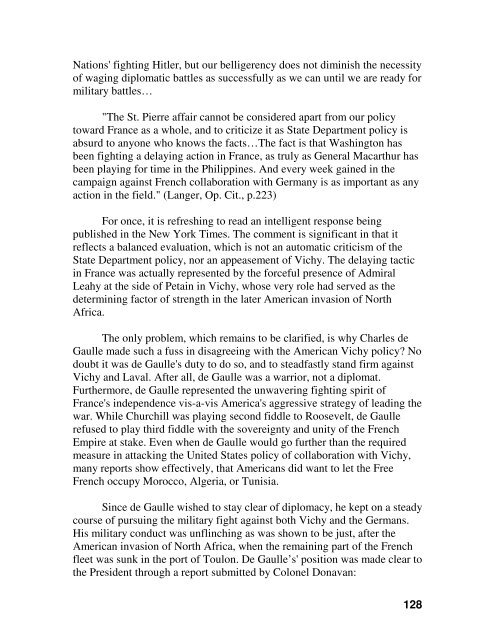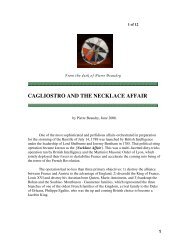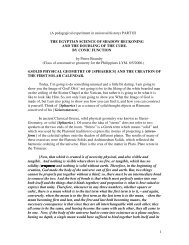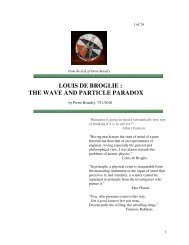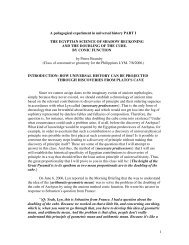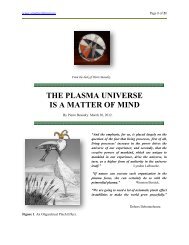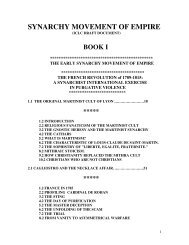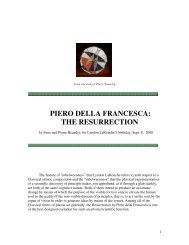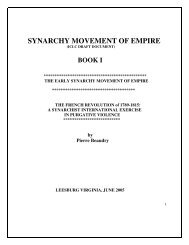synarchy movement of empire book ii - Pierre Beaudry's Galactic ...
synarchy movement of empire book ii - Pierre Beaudry's Galactic ...
synarchy movement of empire book ii - Pierre Beaudry's Galactic ...
Create successful ePaper yourself
Turn your PDF publications into a flip-book with our unique Google optimized e-Paper software.
Nations' fighting Hitler, but our belligerency does not diminish the necessity<br />
<strong>of</strong> waging diplomatic battles as successfully as we can until we are ready for<br />
military battles…<br />
"The St. <strong>Pierre</strong> affair cannot be considered apart from our policy<br />
toward France as a whole, and to criticize it as State Department policy is<br />
absurd to anyone who knows the facts…The fact is that Washington has<br />
been fighting a delaying action in France, as truly as General Macarthur has<br />
been playing for time in the Philippines. And every week gained in the<br />
campaign against French collaboration with Germany is as important as any<br />
action in the field." (Langer, Op. Cit., p.223)<br />
For once, it is refreshing to read an intelligent response being<br />
published in the New York Times. The comment is significant in that it<br />
reflects a balanced evaluation, which is not an automatic criticism <strong>of</strong> the<br />
State Department policy, nor an appeasement <strong>of</strong> Vichy. The delaying tactic<br />
in France was actually represented by the forceful presence <strong>of</strong> Admiral<br />
Leahy at the side <strong>of</strong> Petain in Vichy, whose very role had served as the<br />
determining factor <strong>of</strong> strength in the later American invasion <strong>of</strong> North<br />
Africa.<br />
The only problem, which remains to be clarified, is why Charles de<br />
Gaulle made such a fuss in disagreeing with the American Vichy policy? No<br />
doubt it was de Gaulle's duty to do so, and to steadfastly stand firm against<br />
Vichy and Laval. After all, de Gaulle was a warrior, not a diplomat.<br />
Furthermore, de Gaulle represented the unwavering fighting spirit <strong>of</strong><br />
France's independence vis-a-vis America's aggressive strategy <strong>of</strong> leading the<br />
war. While Churchill was playing second fiddle to Roosevelt, de Gaulle<br />
refused to play third fiddle with the sovereignty and unity <strong>of</strong> the French<br />
Empire at stake. Even when de Gaulle would go further than the required<br />
measure in attacking the United States policy <strong>of</strong> collaboration with Vichy,<br />
many reports show effectively, that Americans did want to let the Free<br />
French occupy Morocco, Algeria, or Tunisia.<br />
Since de Gaulle wished to stay clear <strong>of</strong> diplomacy, he kept on a steady<br />
course <strong>of</strong> pursuing the military fight against both Vichy and the Germans.<br />
His military conduct was unflinching as was shown to be just, after the<br />
American invasion <strong>of</strong> North Africa, when the remaining part <strong>of</strong> the French<br />
fleet was sunk in the port <strong>of</strong> Toulon. De Gaulle’s' position was made clear to<br />
the President through a report submitted by Colonel Donavan:<br />
128


